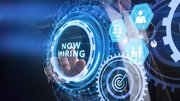Article
In search of a 'smart' city: Dallas mayor, Microsoft, Mastercard
Mayor Michael Rawlings offers his own take on what defines a "smart city." Microsoft and Mastercard are also working to bring Rawlings' vision to fruition.

February 27, 2019 by Elliot Maras — Editor, Kiosk Marketplace & Vending Times
Mayor Michael Rawlings wants Dallas to be a "smart city." But in discussing his aspirations during the recent Money2020 show in Las Vegas, the mayor offered a unique twist on a movement that is generating a lot of investment — both public and private — as of late. The "smart cities" movement is best known as a set of initiatives to connect objects — such as kiosks, buildings and vehicles — to share data to optimize energy use, coordinate traffic management, reduce congestion and provide access to real-time information.
Rawlings, who has enlisted the support of local stakeholders and financial and technology companies, envisions a "smart" city as a place where people want to live and companies want to do business. To make this vision come to fruition, he believes his city needs to become more efficient, safe and attractive to business. One of the most important ways to reach these goals is to improve the lives of its low-income residents, which in his view can best be accomplished through education.
It is unfortunate, the mayor said, that a person can graduate high school without taking a financial management course. He said he is amazed by the number of unbanked people in his city. He also wants to make residents more mobile so they can get to work faster.
Dallas makes progress
On the positive side, Dallas has had a lot of technology startups, Rawlings said. One sign of this is the fact that Dallas has more technology employees than Austin, a city that people often view as a technology center. He gives credit for Dallas's success in this area to the Dallas Innovation Alliance, a coalition of stakeholders from the city, corporations, civic and non-governmental organizations, academia and private individuals. The alliance defines a "smart city" as one where social and technological infrastructures and solutions facilitate and accelerate sustainable economic growth and resource efficiency, while improving the quality of life for its citizens.
Joining the mayor in his keynote presentation were Craig Vosberg, president of Mastercard North America, and Trudy Norris-Grey, managing director of Microsoft CityNext. Mastercard is working to improve access to financial services for residents, visitors and businesses, while Microsoft is working to optimize urban infrastructure. Microsoft's specific approach is to leverage cloud technology to make "smart city" solutions more affordable and economically viable.
Asked how Mastercard is helping the mayor achieve his ambitions, Vosberg said Mastercard is able to use data to help cities do a better job of serving the needs of constituents. He said Mastercard can help cities deliver services more efficiently and compete more effectively on a national or global scale for investments.
"It starts with things like thinking through, with cities, what are some of the challenges they're facing and how can we bring data and technology to bear," Vosberg said.
For example, a mayor might want to know the impact of a particular investment the city could make. Mastercard can use transaction data to evaluate —down to the level of a city block —the impact that investing in a park's refurbishment will have on overall activity, as well as attracting an anchor tenant to a mall, making transit more efficient or providing broader access to financial services.
"Mobility is such a critical issue," Vosberg said, echoing the mayor.
Another decision that Mastercard might help a city evaluate is installing paid parking meters, he said.
Mastercard can also provide payment tools combined with identification programs, which cities often invest in to give underserved residents better access to city services.
"If you combine that with payments functionality that can be used to receive or make payments, you're then extending the value of electronic payments to a whole new and broader financial services to a whole different class of constituents," he said.
Helping cities with financial expertise
Norris-Grey asked Vosberg to drill down on how Mastercard helps a city address its challenges with financial instruments. Vosberg responded that the company provides resources and expertise to public/private partnerships to help cities innovate faster. The company also works with urban coalitions that allow city leaders to share success stories with one another.
Mastercard's efforts include helping cities align their objectives around their actual needs, and helping them establish viable economic models for achieving their goals. Aligning objectives in such a way is different from philanthropy, Vosberg said.
Rawlings said politicians have to learn to endorse free enterprise to improve the quality of urban life. Politicians often find this challenging, Rawlings said, since the "free enterprise" term often has a negative connotation with their political base.
About Elliot Maras
Elliot Maras is the editor of Kiosk Marketplace and Vending Times. He brings three decades covering unattended retail and commercial foodservice.
 ChatGPT
ChatGPT Grok
Grok Perplexity
Perplexity Claude
Claude









